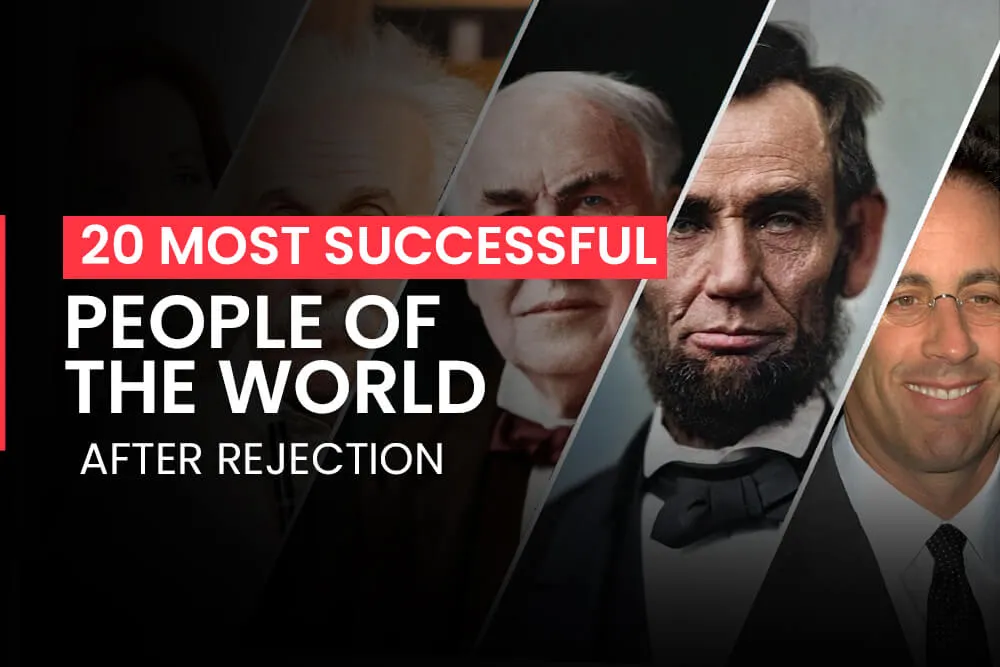
20 Most Successful People Of The World After Rejection
Table of Contents
ToggleInception:
The path to success is not always linear. It brings along with it, many mistakes, setbacks, and rejections. That is why a student needs to access top dissertation writing services to overcome these hurdles. Initially, it feels heart-wrenching to expect something big and end up losing everything. Often these setbacks were the beginning of great things or a time to pause and reflect.
Normally a successful person is thought of as the one who was always destined to be so. Even some intellectual students need research proposal help UK based to boost their academic careers without failing. Some of the most successful people in the world faced countless setbacks before achieving greatness. Below are the stories of the mistakes and shortcomings of the people who are acknowledged as successful globally.
List Of 20 Most Successful People After Rejection
Albert Einstein:
The first person on the list of successful people is Albert Einstein, who is an inspiration to the masses. I would not mind to write my dissertation while considering his name as compatible with intelligence. The truth behind this image is entwined with bitter realities. He was not born as Albert Einstein.
He took four years to start talking as a child. Probably, he took time to meditate on something bigger later on. He could not read until he was seven and appeared to be mentally retarded. If he had ceded and never persisted, his core beliefs would not have been known. He was awarded the Nobel Prize and changed the global approach to physics.
Thomas Edison:
Thomas Edison faced the most depressing opinion from a teacher. He was told that he was too stupid to learn anything. It was the worst teaching practice ever by any teacher to have. Had his teachers not died before, they would have faced the embarrassment of injury. Further, he spilled some acid on the floor as an employee at Western Union, so he was fired.
Edison later received more than 1,000 patents, including the practical electric lamp and the phonograph. His innovation proved him the most prolific inventor of all time, just like dissertation methodology help is a pioneer in the industry of academic help services. His creations changed the lives of billions of humans around the globe.
Abraham Lincoln:
Abraham Lincoln had to face numerous deteriorations. A special feat occurred when he joined the army as a leader just to come back to the lowest level of military service. Then, he tried his luck with several failed business attempts, one after the other, and he quietly suffered the inconvenience.
Undeterred, Lincoln entered politics and made several unsuccessful attempts at the political office before becoming president. He viewed the failure as nothing worth it. In fact, the contentment with the failure was a thing of concern for him.
Walt Disney:
Earlier in his career, Walt Disney was told by a newspaper editor that he lacked imagination and good ideas. Well, it would have been the wild imagination of that editor if Walt had listened to him. Undaunted, Old Walt created a cultural icon out of his name.
Now, no child can imagine their childhood without Disney. He developed an understanding of the importance of failure at a young age after his personal experiences. According to him, initial failures make one fearless about falls and all that.
Realization of this fact brought the creation of dissertation proofreading services UK-based to encourage students that mistakes do happen, but they need to be treated in the initial steps. In proofreading, they are noted down for correction. It is a process for identifying errors and marking them for correction. Proofreading is also said to be like a draft and is the final stage of your revision, where the author gets a last chance to search for any errors before submission (helpwithdissertation, 2021)
J.k Rowling:
J.K. Rowling was a depressed, broke, and divorced lady. She was a single mother, too, who wrote a novel in college. No one can believe it, but many publishers have rejected Harry Potter. Now she has inscribed her name among the richest women in the world. Rowling had to confront the wizard to face welfare.
She reflected upon her past failures in these words,
“It is impossible to live without failing at something, unless you live so cautiously that you might as well not have lived at all, in which case, you fail by default.”
Jerry Seinfeld:
Jerry Seinfeld got a minor role on the sitcom Benson. He was fired without being informed and came to know when he went for a read-through. Seinfeld was a young comedian. His first on-stage performance was a total disaster. When he faced the audience for the first time, he was knocked down.
He has a choice between pulling himself together and admitting that acting is none of his business, or returning to the same scene the next night and making the audience hysterical. He chose to become the most successful comedian of all time.
Michael Bloomberg:
Bloomberg was fired while working as a partner at investment bank Solomon Brothers. Especially after the company was acquired by what would later become Citigroup in 1998. This termination of his job brought a usual severance check, which led him to become the 18th richest person.
Oprah Winfrey:
Oprah Winfrey owns her own TV station. Oprah Winfrey was fired from her first job as a TV host in Baltimore. Now that she owns a TV channel, she cannot be fired again.
So, it was possibly her last major failure in her career. She is a billionaire who is fond of giving away cars. In 2013, Oprah reflected that failure is nothing but a push that life gives us in a different direction.
Steve Jobs:
Steve Jobs had to face a failure that was unique in its kind as he had been fired from the company that he had created. Eventually, Apple caught up with him and placed him in the inevitable position he occupies today. Jobs’ legacy is not the products he has put out, his attitude, or his approach. It is in his vision to drive Apple and ultimately, the computing world forward (Isaacson)
Many other successful people who were rejected have also turned their setbacks into stepping stones. As an example, Walt Disney was at one time informed that he lacked imagination, and Oprah Winfrey was terminated at her initial television employment. Likewise, J.K. Rowling had to go through many setbacks issued by the publishers before Harry Potter was a worldwide hit. The stories are a universal truth: rejection, regardless of how unpleasant, can give people a drive and resistance, and make people great, when it was not supposed to happen.
Stephen King:
In yet another case of the inexplicable instances of publishers making stupid decisions, Carrie, the first book by mega-novel author Stephen King, was rejected 30 times. The publishers also told this iconic narrator that they weren’t interested in negative utopian science fiction. The reason behind this silly interpretation was the silliest assumption that such books fail to generate revenue. The frightened king threw the book into the bin. His wife took him in and begged him to introduce it again, which led to his first book and the start of a brilliant career.
Bill Gates:
After leaving Harvard, Bill Gates started a business with Paul Allen called Traf-O-Data, which failed. Luckily, they tried to go into business again, and this time they got hold of Microsoft. These kinds of failures remind us that even the most successful individuals have experienced rejection and failures in the past. It is easy to assume that early failure by Bill Gates would make him quit, but he took it as a stepping stone. It is this strength that makes achievers different from those who cannot persist. In fact, history has shown that the most rejected person in the world is often the one who rises the highest because rejection fuels growth, determination, and innovative thinking.
Charles Darwin:
The man who is credited with much of the understanding of the world today was once considered an average student. This assumption provided a reason for his dropping out of medical school.
Darwin explored the study of nature throughout his life. This led to a change in the course of human existence as was perceived before the groundbreaking ‘On the Origin of Species’.
Darwin had no intention of becoming a scientist until his dad started calling him lazy and too sleepy. He once said that all his teachers and his father considered him a normal child below the usual intellectual level.
-
Socrates:
He was, in fact, a visionary, but came at an unfavorable time. By the time he lived, his new ideas marked him as a “corrupter of the youth” and led to his death sentence. However, this continued until he was forced to consume hemlock himself. Death could not diminish his name from the minds of millions till today. He was remembered through the writings of his disciples, one of whom was Plato, who retained his teachings and developed them into coherent philosophies that still inform the thinking of the present.
The critical inquiry and reasoning that formed the basis of Socrates’s philosophy was due to his persistence in seeking the truth even in the face of persecution. His questioning approach is now a pillar of education, over centuries, as it challenges the assumptions made, takes things apart, and finds wisdom in places other than appearances. By doing so, Socrates overcame the tragedy of his execution, becoming eternal in the everlasting power of his philosophy.
-
Isaac Newton:
In mathematics, Newton was certainly a magician, but in other things, he did not excel. He never did well in school. When he started working on the family farm, he failed miserably. Then he was sent to Cambridge to let history speak of his worth. At Cambridge, Newton had a place that created his curiosity and mind. He gave himself up to mathematics, to natural philosophy, to astronomy, in which soon the genius of his genius was to rest heavily upon.
He arrived at the university at a time of intellectual enlightenment in Europe, and it would not take long before Newton was singled out due to his thinking capability to go beyond conventional teaching. It is here that he started developing the principles of calculus, the science of optics, and the laws of motion, which preconditioned the further discoveries that were to change science indefinitely.
-
Marilyn Monroe:
Towards the start of her career, modeling agencies advised her to consider becoming a secretary. Her childhood also marked some difficult situations. She rose herself as the first woman to initiate a production house. Her films gross more than hundreds of millions of dollars.
-
Steven Spielberg:
The film’s production grossed more than $9 billion, along with winning over three Oscars. Can anyone believe that a person who is now the best in the industry was snubbed by the USC School of Cinematic Arts? Steven Spielberg, in particular, also suffered from dyslexia, which made it difficult for him to go to school. The school erected a building in honor of Steven Spielberg.
He has received 3 Oscars, 7 Golden Globes, and 11 Emmys to date and is one of the most successful directors of the current era.
-
Emily Dickinson:
Although Dickinson is loved now, she was not there then. In fact, it was so sad that she could not get her poems published during her lifetime. Her total compositions were some 1,800 in number. She could publish less than a dozen in her life.
-
Michael Jordan:
Six leagues and five MVPs later, Michael Jordan is arguably the greatest basketball player of all time. But was fate always in favor of this great basketball player? Probably not, but it is true that fortune favors the brave. Once he recollected that he had missed over 9,000 shots in his career. Also, he lost almost 300 games. He was given 26 winning shots, which he missed out on. Further, he said that he made mistakes over and over in his life, which is the reason behind his success.
We are reminded by such stories as Jordan’s that failures are stepping stones to success. History is full of famous rejections that later turned into legendary success stories–writers whose manuscripts were initially discarded, entrepreneurs who were told their ideas wouldn’t work, and athletes who were doubted early on. These examples show that rejection is not the final point, but it is the opportunity to become stronger and better, and the opportunity to correct oneself, perfect their profession, and come to the world again.
-
Rudyard Kipling:
In 1889, he was fired as an employee of the San Francisco Examiner because the editor told him, “I’m sorry, Mr. Kipling, but you just don’t know how to use the English language.”
-
Vincent Van Gogh:
Those who have great taste in art must be interested in buying Van Gogh paintings. These paintings would cost the buyer over $100 million these days. But Vincent van Gogh had not had a successful life period. Unfortunately, he too couldn’t get rid of failures and setbacks.
During his lifetime, he sold only one painting, The Red Vineyard, and the sale took place shortly before his death. Others were able to reap the financial spoils of his lifelong struggles. He mentioned success as an outcome of a series of failures.
-
Elon Musk: How to Win Over the Sceptics on Technology
During the pitching of Tesla and SpaceX, Elon Musk was turned down. Many investors doubted electric cars and space exploration on a personal level. He was turned down on a number of occasions before receiving the finances. Today, Tesla is dominating the electric market of automobiles, and SpaceX is available to go to space. Musk’s story proves that even successful people in the world have to push through disbelief.
-
Warren Buffett: Rejected by Harvard
Warren Buffett, who is ranked as one of the richest men in the world, was not accepted into Harvard Business School. First, it was heartbreaking to be turned down, yet he pursued studies at the Columbia Business School. It was there that he was introduced to Benjamin Graham, and he became his mentor. Later, Buffett expanded Berkshire Hathaway to an investment powerhouse around the globe. His life shows that being rejected could make one concentrate on more worthwhile paths.
-
Barbara Corcoran: Fired Before Being a Shark
Barbara Corcoran is a real estate investor and a Shark Tank investor who was fired by a former business associate. Instead of resigning, she started developing her own real estate business with the help of a loan of $1000. She eventually built a multimillion-dollar business. Her rejection turned into a powerful comeback story, proving that successful people who were rejected often reinvent themselves.
-
Jeff Bezos: Issues with Amazon
In 1994, the majority of investors did not recognize the worth of Jeff Bezos when he developed the concept of selling books online. It was condemned as being unsafe and non-profit-making. Nevertheless, Bezos did not surrender and made Amazon one of the largest businesses in the world. His journey is a reminder that famous people who got rejected still succeed when they believe in their vision.
-
Sallie Krawcheck: Wall Street Fired
Sallie Krawcheck was a top executive on Wall Street, and in two instances or more, she was fired from high-profile positions. She started Ellevest, which is a women-only investment platform, rather than ending her career. One such way that rejection has resulted in innovation and leadership can be seen in her case, where she started seeking leadership in an industry that has not been welcoming to change.
-
Colonel Harland Sanders: Rejected Hundreds of Times
KFC founder Colonel Sanders had been rejected by more than a thousand restaurants before one of them agreed to buy his chicken recipe. At the age of 65, he later founded the business that was later made into a global brand. His journey shows that the most rejected person in the world might later become a household name.
-
Ferruccio Lamborghini: Tractors and Supercars
The Lamborghini company started as a tractor factory. Lamborghini rose to the occasion after its complaints regarding the Ferrari cars were allegedly ignored by Enzo Ferrari. He went ahead to establish Lamborghini, a luxury car manufacturer that competes with Ferrari in modern times. This repudiation was the direct force in one of the most popular motor brands in the world.
-
Elvis Presley: Told Him That he couldn’t sing
At the onset of his career, Elvis Presley, who was then the King of Rock and Roll, had been advised to part with singing. He continued playing until he was contracted by RCA after being rejected by a record company. He went ahead to change the history of music. Elvis’s story shows that famous rejections do not prevent destiny.
-
Soichiro Honda: Honda Previously Fired Honda
Soichiro Honda had also applied to be employed by Toyota to no avail. He did not retreat; instead, he started making motorcycles. This has now spread to Honda, which is now among the biggest automobile companies in the world. His source of empire was his dismissal.
-
Jack Ma: Failed in Seventeen Companies
The Alibaba founder, Jack Ma, was rejected on numerous occasions. He failed to secure a place at Harvard ten times, and he was not able to work at KFC or many other organizations. Alibaba is also a giant among the world’s e-commerce companies today. His journey shows how successful people in the world can rise after countless failures.
Conclusion:
It is too often that most people take their status quo of rejection as a termination point. These stories of famous people who got rejected remind us that persistence and vision can overcome even the harshest setbacks. Their conscience is unwilling to prick the moment to initiate steps that ensure their success. But rejection is hard and sometimes takes guts. Learning to get up after falling is the key. Even the best dreams are shattered. Those who learn to overcome everything and continue their struggle come out as the icons of the world.
FAQs
Who became successful after rejection?
Many success stories of such celebrities as Steve Jobs, Michael Jordan, and Jack Ma were developed after the refusal.
Do successful people get rejected a lot?
Yes, even the successful ones are bound to be dismissed on several occasions before they reach their goals.
Can rejection make you stronger?
No, it will make the people tougher and stronger, as they will develop rejection.
How many times was Steve Jobs rejected?
Steve Jobs had been turned down on many occasions, the most infamous one being the sacking at Apple.
Recent Comments
No comments have been published yet.







 Whatsapp
Whatsapp Contact
Contact Call
Call Live Chat
Live Chat